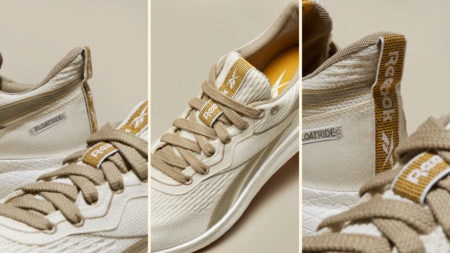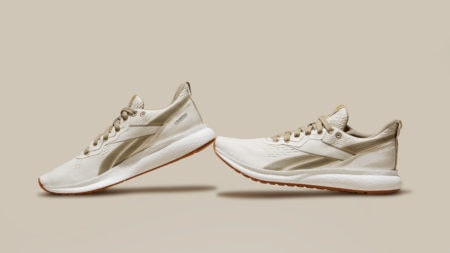In developing its newest shoe, Reebok tried to answer one tough question: How can it create a high-performance running shoe using only natural, sustainable materials?
To find the right ingredients for the new Reebok Forever Floatride Grow, the athletic brand’s innovation team tested dozens of unconventional materials, from fruits and mushrooms to all kinds of vegetables.
The sticking point was the midsole. Traditionally, high-performance running shoes use petroleum-based materials to create a durable, lightweight cushion that can withstand the pounding of runners. And while Reebok has been selling a casual shoe with a corn-based sole since last summer, a running shoe required a heartier base.
“Typically, it’s almost exclusively petroleum: oil that’s drilled or fracked, and then turned into different plastic compounds,” said Reebok brand president Matt O’Toole. “You can see all the environmental issues of that.”
In addition to the environmental impact of harvesting oil and the CO2 emitted in the production process, O’Toole said, “the life cycle of these plastics is pretty much infinite versus plant-based materials.”

Ultimately, the team chose castor bean as the winning plant—the same material used in the soles of sustainable DTC brand Allbirds.
Beyond the midsole, the new Reebok Forever Floatride Grow uses naturally biodegradable eucalyptus tree for the uppers, algae foam for the liner and sustainably sourced natural rubber from Vietnam and Thailand for the sole.
As a challenger brand to industry giants like Nike, getting to a fully sustainable running shoe first is a big deal. And looking forward, Reebok hopes to continue to be a leader in sustainable athletic products.

“Our goal,” O’Toole said, “is to keep perfecting what we call ‘made from things that grow,’ improving this [product] to get more life out of the shoe—even beyond a traditional petroleum-based shoe.”
https://www.adweek.com/brand-marketing/reebok-plant-based-running-shoe-ingredients-list/

